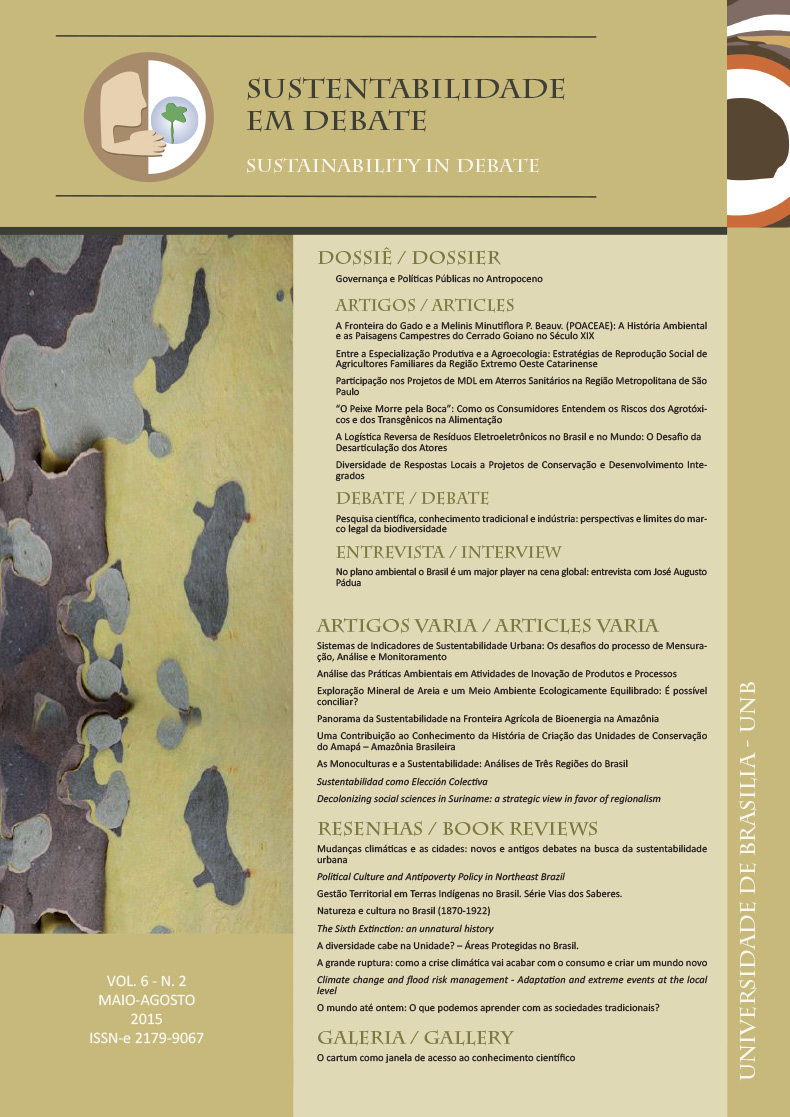Sustentabilidad como Elección Colectiva
DOI:
https://doi.org/10.18472/SustDeb.v6n2.2015.14698Palabras clave:
Sustentabilidad, Elección ColectivaResumen
En este artículo se enfatiza que la sustentabilidad es un asunto de elección colectiva. No existe una definición definitiva de lo que significa ni un procedimiento estándar para alcanzarla. La sustentabilidad siempre será ambigua, y podrá redefinirse en cada contexto donde sea aplicada. Esta característica de la sustentabilidad la torna un asunto de elección colectiva, donde los resultados dependerán de la habilidad de la sociedad para resolver asuntos comunes. Por ello, la sustentabilidad estará asociada a espacios de deliberación donde estarán en juego intereses y valores, pero el éxito estará en la medida que tales espacios traten las causas de los problemas y no simplemente equilibrar los intereses en disputa.
Descargas
Citas
Zedbook, 2013.
AGYEMAN, Julian; EVANS, Bob. “Just Sustainability”: The emerging discourse of environmental
justice in Britain? The Geographical Journal, v. 170, n. 2, p. 155-164, 2004.
ANAND, Sudhir; SEN, Amartya. Human Development and Economic Sustainability. World Development
, v. 28, n. 12, p. 2029-2049, 2000.
ARIAS, Fabio. Instituições e sustentabilidade no ordenamento territorial de três municípios do
Valle del Cauca, Colômbia. Brasilia: UnB, 2012.
DALY, Herman. From Uneconomic Growth to Steade-State Economy. Northampton: Edward Elgar,
2015.
DIAMOND, Jared. Colapso. Por qué unas sociedades perduran y otras desaparecen. Bogotá:
Debolsillo, 2007.
EVANS, Peter. A la búsqueda de agentes para la habitabilidad urbana en una economía política
globalizada. En EVANS, P. Instituciones y desarrollo en la era de la globalización neoliberal. Bogotá:
ILSA, 2007.
GEORGESCU-ROEGEN, Nicholas. Energy and Economic Myths. Southern Economic Journal, V.
41, N. 3, p. 347-381, 1975.
GEORGESCU-ROEGEN, Nicholas. Entropy Law and the Economic Process. Cambridge, Harvard
University Press, 1971.
HARDIN, Garrett. The Tragedy of the Commons. Science, v. 162, p. 1243-1248, 1968
JACKSON, Tim. Prosperidad sin crecimiento: Economía para un planeta finito. Barcelona: Encuentro
Icaria-Internón Oxfam, 2011.
KATES, R.; PARRIS, T.; LEISEROWITZ, A. What is sustainable development? Goals, Indicators,
Values and Practice. Environment. v. 47, n. 3, p. 8-21, 2005.
OLSON, Mancur. A lógica da ação coletiva: os beneficios públicos e uma teoria dos grupos sociais.
São Paulo: Editora da Universidade de São Paulo, 1999.
OSTROM, Elinor. Governing the commons: the evolution of institutions for collective action.
New York: Cambridge University Press, 1990.
RATNER, Blake. “Sustainability” as a dialogue of values: Challenges to the sociology of development.
Sociological Inquiry , v. 74, n. 1, p. 50-69, 2004.
SACHS, Ignacy. Caminhos para o Desenvolvimento Sustentável. Rio de Janeiro: Garamond, 2002.
SACHS, Ignacy. Estratégias de transição para o século XXI: desenvolvimento e meio ambiente.
São Paulo: FUNDAP, 1993.
SEN, Amartya. Desarrollo y libertad. Bogotá: Planeta, 2000.
SOLOW, Robert M. An almost practical step toward sustainability. Resources Policy, v. 19, p. 162-
172, 1993.
SWYNGEDOUW, Erik. Impossible sustainability and the post-political condition. En KRUEGER, R.;
GIBBS, D. The sustainable development paradox . Urban political economy in the United States
and Europe, p. 13-40. New York: Guildford, 2007.
SWYNGEDOUW, Erik. ¡La naturaleza no existe! La sostenibilidad como síntoma de una planificación
despolitizada. URBAN, p. 41-66, 2011.
Descargas
Publicado
Cómo citar
Número
Sección
Licencia
La presentación de la(s) obra(s) científica(s) original(es) por parte de los autores, como titulares de los derechos de autor de los textos enviados a la revista, de conformidad con la Ley 9.610/98, implica la cesión de derechos de autor de publicaciones impresas y/o digitales a la Revista de Sustenibilidad en Debate de los artículos aprobados para fines de publicación, en un único número de la Revista, autorizando también que la(s) obra(s) científica(s) aprobada(s) se divulguen de forma gratuita, sin ningún tipo de reembolso de derechos de autor, a través del sitio web de a Revista, para leer, imprimir y/o descargar el archivo de texto, a partir de la fecha de aceptación para publicación. Por lo tanto, los autores, al presentar los artículos a la Revista y, en consecuencia, la libre cesión de derechos de autor relacionados con el trabajo científico presentado, son plenamente conscientes de que no serán remunerados por la publicación de los artículos en la revista.Â
La Revista está licenciada bajo una licencia no comercial y sin derivaciones Creative Commons (No permite la realización de obras derivadas) 3.0 Brasil, con el propósito de difundir conocimientos científicos, como se indica en el sitio web de la publicación, que permite el intercambio del texto y el reconocimiento de su autoría y publicación original en esta revista.
Los autores pueden asumir contratos adicionales por separado, para la distribución no exclusiva de las obras publicadas en la revista Sustenibilidad en Debate (por ejemplo, en un capítulo de libro), siempre que se indique que los textos se publicaron originalmente en esta revista y que se menciona el DOI correspondiente. Se permite y incentiva a los autores a publicar y distribuir su texto online después de su publicación (por ejemplo, en repositorios institucionales o en sus páginas personales).Â
Los autores aceptan expresamente los términos de esta Declaración de Derechos de Autor, que se aplicará a la presentación si es publicada por esta Revista.









